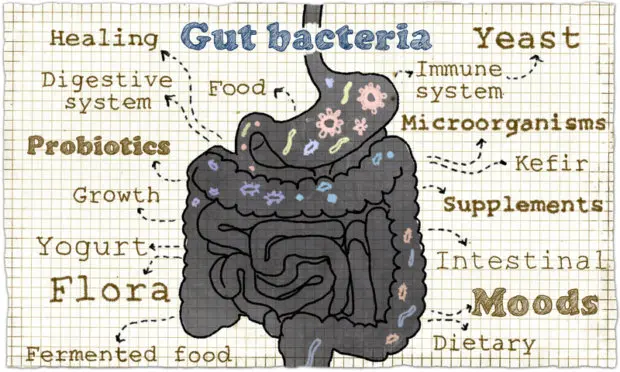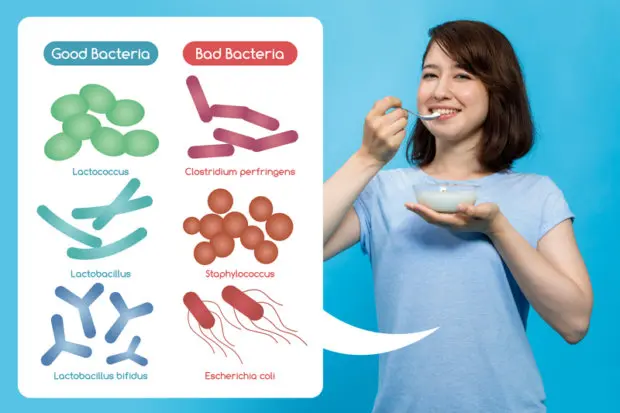Did you know that besides stomach acid, you also have millions of gut flora floating around in your stomach. In fact, Harvard Health reports that you have about 100 trillion gut microbiota all throughout your digestive system. This gut flora can work for your benefit to fight off infections and to metabolize nutrients from your food. Medications, your environment and your diet can affect whether your gut flora can help your body function at its best of if you are susceptible to infections.
How Your Digestive System Works
To have a healthy body, you must eat throughout the day to get fuel for your body to run. You must eat foods—preferably healthy ones—to get vital nutrients your body needs to work properly too. Vitamins and minerals are components found in food that your body can’t make on its own. It draws vitamin and mineral compounds from your food and uses them to build tissues, cell membranes, produce blood, regulate your hormones and to perform all your body functions. When you don’t get vital nutrients in your diet, you will start to have health problems.
As you eat, your saliva starts to break down foods with the help of bacteria and saliva acid. That food will travel down your esophagus to your stomach, which is a holding cell for food. Gastric juices and stomach acids break down food particles into tiny particles. Acids help kill harmful bacteria in the food you’ve eaten before the food is small enough to be broken down into individual vitamins, minerals and waste products. That food then goes through the small intestine, which continues the breakdown as vitamins, minerals, proteins, fats and carbs are extracted.
Your pancreas, liver and gallbladder remove fats from your food and filters waste products as your nutrients pass through the intestinal wall into your blood for transport all over the body. However, it passes through the liver for this process. The liver filters out all the good stuff for your body and sends all your waste products to your large intestine. Those waste products pass through the large intestine, where water is absorbed by your body and the waste is disposed of. Your entire digestive system relies on muscles, enzymes and bacteria all breaking down your food for fuel and nutrients. Your gut flora is the bacteria all throughout this system helping that powers digestion.
What Is Your Gut Flora?
Flora is defined as plants of a particular region or habitat. In the case of your gut flora, this is a habitat or community of bacteria and enzymes all designed to make digestion and food breakdown possible. Your gut flora is sometimes referred to as “gut microbiota” or “intestinal microbiota”. This is the entire system of organisms that aid your digestive system. Gut flora helps your body to metabolize nutrients from the foods and drinks you ingest. You can have gut flora that are stellar at breaking down your food and for fighting off infections and inflammations. Harvard Health reports that your gut flora can also help produce substances your body needs for certain processes. An example is vitamin K, which gut flora can help produce for blood clotting and protein usage in the body.
Patients can have healthy gut flora if they have healthy, nutrient-rich diets. However, the modern American diet is full of sugary, processed foods. These are low in nutrients and high in substances that cause inflammation and poor digestive function. When you eat healthy, you have lots of good bacteria that work to make your digestive system healthy. You can literally feel lighter if you’re eating well. On the other hand, if you eat unhealthy, nutrient-poor foods all the time, you are ingesting tons of chemicals and compounds that don’t help your gut flora at all. They simply clog up your system with toxins that make digestion sluggish and nutrient-harvesting slow.
Facts About Gut Flora
We’ve established that if you eat well, you have gut flora—or bacteria and enzymes—that break down you food efficiently. Eating poorly leads to the opposite as you have digestive problems and chronic health symptoms. Your gut flora can also:
- Influence your immune system. Eating well helps your gut flora to reduce your risk for cancer or its progression.
- Affect your weight. Thinner people tend to have different, more productive gut flora than patients who eat poorly or who are overweight.
- Boost inflammation. Unhealthy bacteria in your gut flora can cause inflammation in your body. This can happen with allergies or with foods you’re intolerant to as well. More inflammation means swelling and faster aging in the body. Gut flora is used more heavily to combat that inflammation instead of extracting nutrients.
- Lead to chronic conditions. Patients with more inflammation will experience more joint deterioration, which can lead to arthritis. Harmful bacteria in your system from a poor diet can also lead to digestive upsets, heartburn, gas, intestinal diseases and more because there is not enough gut flora working to promote good health. You may even get headaches and migraines because of what you’re putting in your mouth.
Your Healthy Body
Patients come to us seeking a better way of life that they can achieve through rehabilitative and therapeutic means instead of surgery and harmful treatments. For many health problems, your digestive tract and diet will determine your risk for low-grade health problems, chronic conditions and diseases. Even your neuropathy symptoms that cause you pain and aches in your back could be related to how you are eating. If you want a healthy, strong body, start with your diet.
Make sure you eat plenty of fruits, veggies, protein, and whole grains so your body gets the nutrients it needs to stay strong. If you get low-grade health symptoms—especially with certain foods, get tested for food intolerances and allergies. This can decrease the inflammation your body gets from toxic substances reacting to your gut flora. Proper testing can help determine if your inflammation, back problems, neuropathy symptoms and health issues in general relate back to your diet or to an injury. For help to have a healthier body, call Spine Correction Center of the Rockies at (970) 658-5115!



